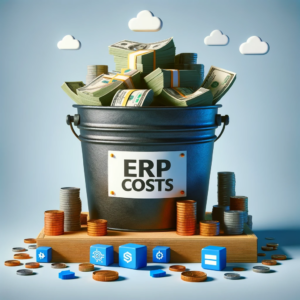
Cross-Platform Integration Challenges in ERP Systems
Using enterprise resource planning (ERP) software can be extremely useful when developing your business. These tools help to bring together many key aspects of your business, from inventory management to customer support and stock control. For that reason, many companies who have pivoted to using ERP software will want to integrate this platform into every aspect of business.
While that sounds like a great idea, many cross-platform integration challenges can exist in ERP systems. While every business has unique challenges it has to face, some common and typical difficulties can arise if a company is not prepared to deal with them accordingly.
Cross-Platform Integration Challenges In ERP Systems
The Cost

One of the most common challenges involving cross-platform integration is the cost. Costs are important, and many companies can find themselves out of pocket during the implementation and integration. ERP systems, especially when developed from scratch, can be very expensive. This means that the cost can soon add up, leaving you with a mountain to climb.
The cost is one of the most common challenges that will be faced because it is also the most important. If integrating this ERP costs significant sums of money to implement, then the business needs to see results quicker. Cross-platform integration often means having the ERP adjust slightly to suit each platform, which further adds to the costs. Before long, these costs can seem almost impossible to overcome and, if any problems arise during integration, could further impact productivity thus reducing profits.
Naturally, you want to do all that you can to avoid such a scenario.
The Training
Another aspect related to cost also comes down to training. Your staff, across each platform, must be given adequate training to start using your new ERP systems. As such, you need to be willing to invest the required time and money into the training program. Crucially, since each platform might use the ERP slightly differently, training has to be modified and made bespoke to each department.
This soon adds up costs, as you must wait for staff to complete the training specific to their platform. For example, you might be using your ERP system across multiple devices and systems – some on Apple, some on Windows, some on Linux – which means having training programs developed for each style, not just one training program.
That adds to the time, cost, and requirement for staff to undergo the correct training. That can soon become very expensive in terms of time and opportunity.
Avoiding Lost Productivity
When implementing an ERP system into one platform, you can easily plan how long it will take to get things back up and running and ‘back to normal’. However, if your business uses multiple platforms, you will often be dealing with more than one system or service being shut down or stopped temporarily. Naturally, this means that your business has less earning power.
It means that you will likely have a business that cannot produce results while the change is being undergone. Yet your staff will have to be paid for their training time, and then there will be an adjustment period where productivity remains inconsistent as staff get used to the ERP system.
Your business has to find a way to absorb those lost hours of productivity. If you have to transform how your business operates across all platforms simultaneously, these problems can soon become a serious issue to your ability to profit.
Customised Options
Another common issue that can make an ERP system integration across multiple channels difficult is customisation. Every ERP can be made adjustable for each platform, but you need to ensure that the customisation being included is worthwhile. Often, this is simply a case of trial and error: you might not know how an adjustment will play out when it is included in one platform but not the next.
You need to take the time to determine which platforms need to be given what kind of customisation. That naturally adds time and stress to the experience, making it more difficult to customise and set up your system properly. There has to be time committed to testing and trials so you know exactly what functions each platform is going to require.
 Full Connectivity
Full Connectivity
As you try and connect together all of your platforms and software systems into one system, there will be teething pains. Some software might not play nice with the ERP; others might not be compatible with a bespoke, custom-built ERP. This often means evaluating the software and platforms you are using and determining what has to be replaced to be ERP-compatible.
If you have invested a lot of time and money into your ERP system, you want it to become the backbone of operations. Ensuring that each piece of software you use and each platform you work across can easily connect to the ERP is a priority. However, getting full connectivity often means compromising on certain features or committing the masse of time needed to get the implementation correct.
Trial & Testing
The other main challenge can be successfully implementing ERP systems without having the time needed for a full testing cycle. You will only know how good your ERP system is once it is in place, ready to go, and your staff is trained. Before then, you should accept that peaks and troughs in performance are likely.
These challenges mean giving your team the time to properly test out the system and work out where the weaknesses lie. It also means preparing for these errors to impact productivity potentially. Most of the time, true trial and testing can only take place once operational and staff have been trained: this means that trying to get your day-to-day work done whilst testing the system becomes akin to building a plane whilst flying it.
Need Help With Integrating ERP Systems?
If you intend to install an ERP system into your business, you might need expert support to avoid errors. If you need any assistance in doing this, you can contact BlueHub today. We can offer you the support you require to integrate ERP software across multiple platforms much more easily.
Contact us today to discuss your cross-platform integration issues for a reliable solution.